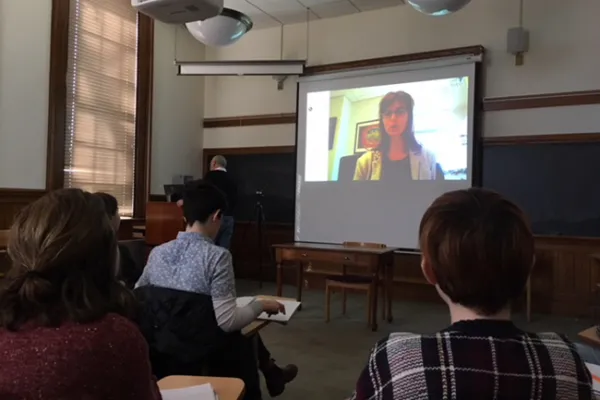Just the Facts: Coral Davenport ’98 on Environmental Reporting
Campus Life

Published April 3, 2018
Reporter Coral Davenport ’98 covers climate change for The New York Times. But she says she’s not an environmentalist.
“My job as a reporter is to find out the facts and report them accurately,” she told students during a Skype interview in government professor Greg White’s class, “not to have an agenda or to be a tool of someone else’s agenda.”
The role of reporters in covering policy was a recurring theme in the interview with Davenport, who majored in English language and literature at Smith and launched her journalism career at the Daily Hampshire Gazette.
Students asked her about recent policy trends in Washington, her storytelling techniques and her 2016 interview with President Barack Obama—which they read for the class.
Here are excerpts of Davenport’s Skype session with students:
How worried should we be about [Environmental Protection Agency Administrator] Scott Pruitt’s policies?
“Pruitt has initiated more than 30 regulatory rollbacks. At the same time, there’s been a huge loss of staff at the EPA, and it’s harder to do a lot with limited resources. It’s also hard to see how a lot of these rollbacks will stand up in court. At least three of them have already been slapped down by the courts. Pruitt’s biggest challenge is the law.”
How do you access government sources and has that changed since President Donald Trump’s election?
“Getting access to legislators in Washington is easy. The men’s room right off of the Senate floor is the best—I wait there to buttonhole them. (There is a women’s room, also, but it’s further away, and sad to say, there are still more men in Congress.) Every member of Congress has a media person, and in a functional administration they will let relevant staffers and lawmakers know about policies that are going to be announced. In this administration, a lot of times no one knows what’s going to happen until it happens.”
How do you decide which policies to cover?
“That question stresses us out every week because there’s so much news. This administration is a fire hose of news. We have six White House reporters, and someone has to start work at 5 a.m. waiting for the president’s first tweet. Some things that define news are: Is there something happening that’s illegal or improper? Something that breaks precedent or has a really big impact on people? Also, what time is it—how much time do I have to deal with it?”
How do you deal with social media?
“I’m on Twitter and Facebook. I tweet my stories and those of my colleagues, and I follow about 2,000 Twitter accounts. My Facebook account is private—mostly for pictures of my kid. I have had people gang up on me on social media. When people write ridiculous things on my feed, I heart them and say, ‘Thanks for reading me!’”
What was it like to interview President Obama? Were you nervous?
“So nervous! The logistics for that interview actually took four months. The White House chose the topic of the environment, and they were the ones who wanted to do the interview in Hawaii. It took place at 8 a.m. in a presidential cottage; we had to be there at about 4:30 a.m. The president’s staff told us that there would be no pictures and no hanging out. When Obama came in, he said hello to everyone—and hung out. And at the end, he said, ‘You guys really want pictures, right? Have you seen the view outside on the deck?’”
Did you give Obama’s team questions in advance?
“No. Never. Never! The most we gave them was the topic. We knew we needed to have a 2,000-word story that was sweeping and colorful and rich and that would be posted 48 hours after the interview. We wrote as much as we could in advance…It was September of 2016, and everyone thought it was obvious the next president would be Hillary Clinton. I said [to Obama] ‘Just imagine that Trump is elected, and he decides to roll back your environmental protections.’ He gave a decent answer. We ended up reposting that story after the election.”
Do you plan to interview President Trump?
“He actually loves talking to us. If the opportunity presents itself, I am right here!”
Students in a Smith government class conducting a Skype interview with New York Times reporter Coral Davenport '98.